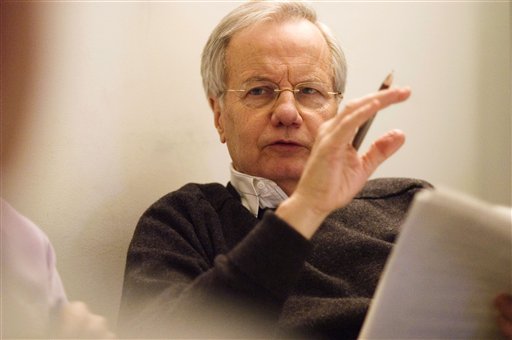 |
| Bill Moyers |
Campbell, according to Moyers's introduction to the book ...
... believed there is a "point of wisdom beyond the conflicts of illusion and truth by which lives can be put back together again." Finding it is the "prime question of the time."
By "the conflicts of illusion and truth," I assume Campbell meant that, inasmuch as we are all heirs to the European Enlightenment, our modern tendency to be skeptics has been taken to an unfortunate extreme. We tend to pooh-pooh the idea of seeking ultimate spiritual truth. We say the various "masks of God," as delineated by Campbell in his twenty or so books, are but illusions and wishful thinking; they don't stand up to empirical investigation. Yet Moyers quotes Campbell as saying that every religion, every ritual, every myth presents us with ...
... "the masks of eternity" that both cover and reveal "the Face of Glory."
What, then, is "the Face of Glory"? Is it God? Or is God himself a "mask of eternity"? Such questions necessarily lead us away from certainty and into the realm of mystery. Moyers's fuller quote is:
A spiritual man, [Campbell] found in the literature of faith those principles common to the human spirit. But they had to be liberated from tribal lien, or the religions of the world would remain — as in the Middle East and Northern Ireland today — the source of disdain and aggression. The images of God are many, he said, calling them "the masks of eternity" that both cover and reveal "the Face of Glory." He wanted to know what it means that God assumes such different masks in different cultures, yet how it is that comparable stories can be found in these divergent traditions — stories of creation, of virgin births, incarnations, death and resurrection, second comings, and judgment days. He liked the insight of the Hindu scripture: "Truth is one; the sages call it by many names." All our names and images for God are masks, he said, signifying the ultimate reality that by definition transcends language and art. A myth is a mask of God, too — a metaphor for what lies behind the visible world. However the mystic traditions differ, he said, they are in accord in calling us to a deeper awareness of the very act of living itself. The unpardonable sin, in Campbell's book, was the sin of inadvertence, of not being alert, not quite awake.
Since Moyers wrote that paragraph in his introduction to The Power of Myth well over twenty years ago, Northern Ireland has found peace ... but the Middle East has not. There, "disdain and aggression" and "tribal lien" yet rule. We in America are far better off, at first glance, than those who live and die in the Mideast. Yet we, too, have "tribes" across whose boundaries mutual suspicion is the order of the day. Just ask anyone who is a member of one of the "tea party" groups, or anyone involved in the recent Occupy Wall Street movement.
Meanwhile, many of our youths are addicted to the "disdain and aggression" and "tribal lien" embodied in their incredibly violent video games and in much of rap music. They would be well-served, in Campbell's view, to study and internalize the "comparable stories can be found in [our] divergent [faith] traditions."
But many of us believe such stories to have been quite properly discredited by science. Can we find a way past the seeming aversion of science to spirituality? Toward the end of his life, Moyers tells us in his introduction, Campbell strove "for a new synthesis of science and spirit." Sadly, I have to think he passed away without having found it. Maybe we can find it now.
Moyers writes:
"The shift from a geocentric to a heliocentric world view," [Campbell] wrote after the astronauts touched the moon [in 1969], "seemed to have removed man from the center — and the center seemed so important. Spiritually, however, the center is where sight is. Stand on a height and view the horizon. Stand on the moon and view the whole earth rising — even, by way of television, in your parlor." The result is an unprecedented expansion of horizon, one that could well serve in our age, as the ancient mythologies did in theirs, to cleanse the doors of perception "to the wonder, at once terrible and fascinating, of ourselves and of the universe." He argued that it is not science that has diminished human beings or divorced us from divinity. On the contrary, the new discoveries of science "rejoin us to the ancients" by enabling us to recognize in this whole universe "a reflection magnified of our own most inward nature; so that we are indeed its ears, its eyes, its thinking, and its speech — or, in theological terms, God's ears, God's eyes, God's thinking, and God's Word."
Can we now be "rejoined to the ancients," incorporating the breakthroughs of modern science into a truly inclusive spiritual awakening? Can we set aside "disdain and aggression" and "tribal lien"? Can we assume our destined roles as "God's ears, God's eyes, God's thinking, and God's Word"? Taken together, those truly amount to the "prime question of the time."

No comments:
Post a Comment